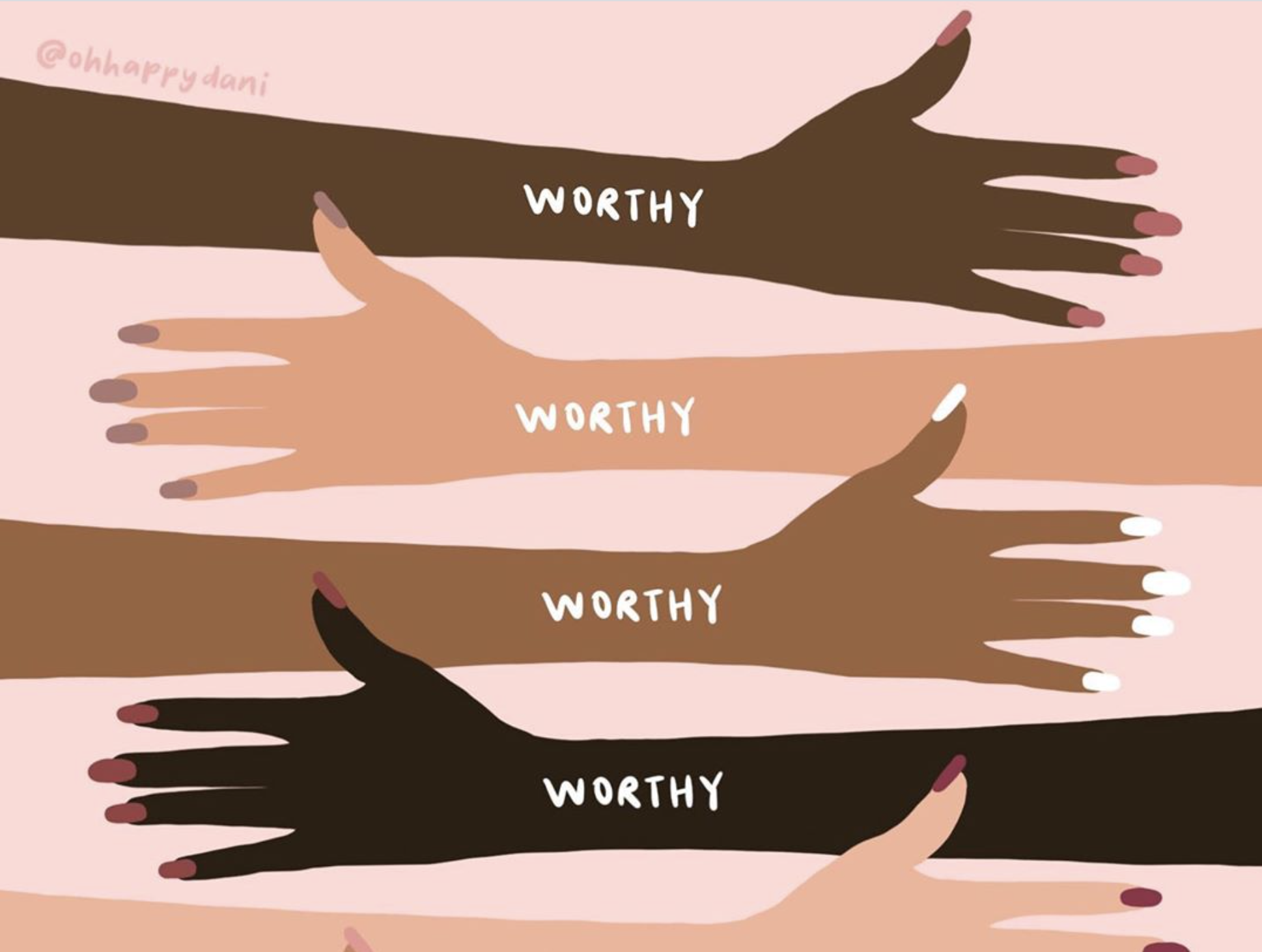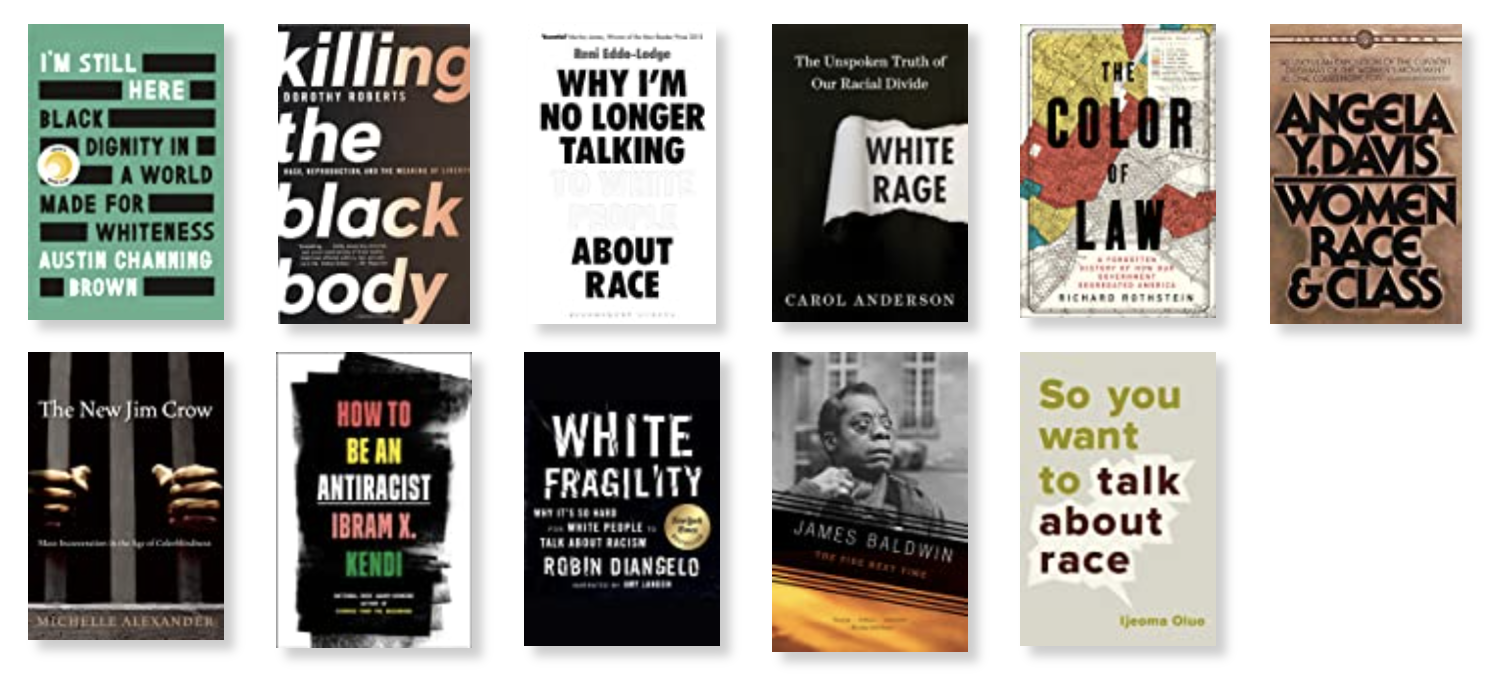What to Read, Listen to, and Watch to Educate Yourself and Take a Stand for Equality

Image Credit to Artist: Danielle Coke of @ohhappydani
A community is only as healthy as its citizens. But inequality and systemic racism cause physical, emotional, mental, and financial harm. Whether the injury is felt in the body—like a lack of safety experienced by people of color—or manifests as an absence of opportunity throughout a lifetime, these issues have far-reaching, negative implications on the health of entire communities.
Inequality stems from sources as heinous as hatred and as seemingly innocuous as indifference. But regardless of its origin, inequality is disruptive to community health, and at its core, represents a shirking of the responsibility the individual has to others. This responsibility each of us have to one another is grounded in shared societal values, a commitment to understanding, and overall empathy and compassion toward other human beings and living things.
As we’ve watched images of pain and anger flash across our screens and heard the cries for an end to long-standing injustices, we’ve had to pause, listen, and refocus on what we can do to be an active part of the solution—rather than once again being a bystander, looking on and hoping for change.
We want to help people create positive change that leads to healthier lives and, ultimately, a healthier world. The health of a community is devastated by inequality, so racism of any kind is antithetical to our aims.
It’s time to take the first steps in the process to help foster equality and improve community health.
Being informed is a prerequisite to effectively fight injustice and inequality—to recognize it, even where it may hide in plain sight. That’s why we’re sharing a list of anti-racism resources to help you recognize the problems, understand different perspectives, spark empathy, and find where you can channel your action to make your community a healthier, happier, more equal place.
WHERE TO START
The Anti-Racism Resource List for Beginners is a starting point to learn about anti-racism work, dismantle the unconscious biases that exist within yourself, and take action to create a more just society.
View this post on Instagram
GET SOCIAL
Too often, social media becomes an echo chamber where we only engage in information from people who look, believe, and live exactly like we do. Take stock of those you follow on Facebook, Instagram, and Twitter. Actively work to follow diverse voices and viewpoints. Organizations that fight racism and racial injustice, like the Center for Antiracist Research and Equal Justice Initiative, are great places to start, while The Conscious Kid focuses on parenting and education through a critical race lens.
READ
- White Fragility: Why It’s So Hard for White People to Talk About Racism by Robin DiAngelo
- The Fire Next Time by James Baldwin
- The New Jim Crow: Mass Incarceration in the Age of Colorblindness by Michelle Alexander
- Why I’m No longer Talking to White People About Race by Reni Eddo-Lodge
- How to Be Antiracist by Ibram X. Kendi
- So You Want to Talk About Race? by Ijeoma Oluo
- I’m Still Here: Black Dignity in a World Made for Whiteness by Austin Channing Brown
- Women, Race & Class by Angela Davis
- White Rage by Carol Anderson
- The Color of Law: A Forgotten History of How Our Government Segregated America by Richard Rothstein
- Killing the Black Body: Race, Reproduction, and the Meaning of Liberty by Dorothy Roberts
More Literary Resources
- Here’s a list of recommended reading to guide the necessary and much needed work of understanding and preventing racism.
- Elizabeth’s Bookshop + Writing Centre is an innovative literacy center designed to amplify and celebrate marginalized voices.
WATCH
- 13th (Ava DuVernay) available on Netflix, Documentary
- American Son (Kenny Leon) available on Netflix, Movie
- Blindspotting (Carlos López Estrada) available on Hulu and Amazon Prime, Movie
- Dear White People (Justin Simien) available on Amazon, Movie and TV Series
- If Beale Street Could Talk (Barry Jenkins) available on Hulu and Amazon Prime, Movie
- See You Yesterday (Stefon Bristol) available on Netflix, Movie
- Selma (Ava DuVernay) available on Amazon Prime, Movie
- The Hate U Give (George Tillman Jr.) available on Hulu and Amazon Prime, Movie
- When They See Us (Ava DuVernay) available on Netflix, TV Series
- Just Mercy (Destin Daniel Cretton) available on Amazon Prime and YouTube, Movie
- Fruitvale Station (Ryan Coogler) available on Amazon Prime, Movie
- Clemency (Chinonye Chukwu) available on Amazon Prime, Movie
- Loving (Jeff Nichols) available on Hulu, Movie
- Time: The Kalief Browder Story (Jenner Furst) available on Netflix, Docu-series
- Whose Streets? (Sabaah Folayan) available on Hulu, Documentary
- A. Burning: The Riots 25 Years Later (One9) available on AETV, Documentary
- Black Panthers (Agnes Varda) available on Amazon Prime, Documentary Short
- I Am Not Your Negro (Raoul Peck) available on Amazon Prime, Documentary
- 3 ½ Minutes, 10 Bullets (Marc Silver) available on Hulu, Documentary/Drama
- Do the Right Thing (Spike Lee) available on Amazon Prime, Movie
LISTEN
- 1619 Podcast (New York Times)
- Code Switch Podcast (NPR)
- Pod for the Cause (The Leadership Conference on Civil and Human Rights Podcast)
- On Point: How to Talk to Your Kids About Racism (WBUR on NPR)
- The Nod (Spotify and Apple Podcasts)
RESOURCES FOR CHILDREN
Don’t forget about your kids. Expand your children’s reading options and knowledge by providing them with books that explore different cultures and ethnicities.
- CNN/Sesame Street Town Hall on Racism
- A Kids Book About Race by Jelani Memory
- We Rise, We Resist, We Raise Our Voice by Wade Hudson and Cheryl Willis Hudson
- Little Legends: Exceptional Men in Black History by Vashti Harrison
- Little Leaders: Bold Women in Black History by Vashti Harrison
- Little Dreamers: Visionary Women Around the World by Vashti Harrison
- 18 Powerful Children’s Books About Race and Racism
GET INVOLVED
- Donate to organizations that are fighting for racial justice and anti-racism. Consider setting up a recurring donation to these organizations if you’re able—this helps give organizations a reliable revenue stream for regular operating costs and long-term planning.
- Seek out and support cultural events in your community. Many major cities put on festivals and cultural events throughout the year. Gatherings like these are typically not well funded, so exploring these options in your city not only helps expand your understanding of different cultures, but it also provides appreciation for diversity within your community.
- Support local Black-owned businesses and community organizations. Here’s where you can shop and donate in several major cities across the United States:
- Sign petitions to make change in your community and across the nation.
- Participate in peaceful protests—and before you go, know your rights.
- Register to vote and exercise your right to vote in every level of government.
- Explore anti-racist resources online and become more educated on the issues that impact your local community.
- Speak up and educate those around you by sharing these resources through your social network.
View this post on Instagram
IT ALL STARTS WITH YOU
Our most important call to action after education on racial prejudice is to recognize our own implicit bias and actively find ways to change for the better. It can be difficult—but it’s so important—to take a hard look in the mirror and identify your own racial or implicit bias.
Implicit bias is a term that describes what happens when, despite our best intentions and without our awareness, racial stereotypes and assumptions creep into our minds and affect our actions. Learn more about implicit bias through these resources:
- Recognize Your Own Implicit Bias to Be Inclusive by Adela Sánchez Askeland
- Implicit bias means we’re all probably at least a little bit racist by Jenée Desmond-Harris
- Implicit Bias The University of Texas at Austin
- The good, the bad, and the ugly of implicit bias The Lancet
Regardless of the resource you decide to start with, the key is to take this first step to help promote equal justice and opportunity. It’s important to start the conversations—no matter how difficult—that will lead to a better understanding of these issues and, eventually, change.
Our CEO Kevin Guest kicked off our discussion in a message to the whole USANA family. It relays how recent events have exposed truths about equality and outlines actions USANA as a company is taking.
We will keep these conversations going. And we’ll continue to stand for equality that helps grow the health of our communities and improves our world for everyone.


Leave a Reply
Want to join the discussion?Feel free to contribute!